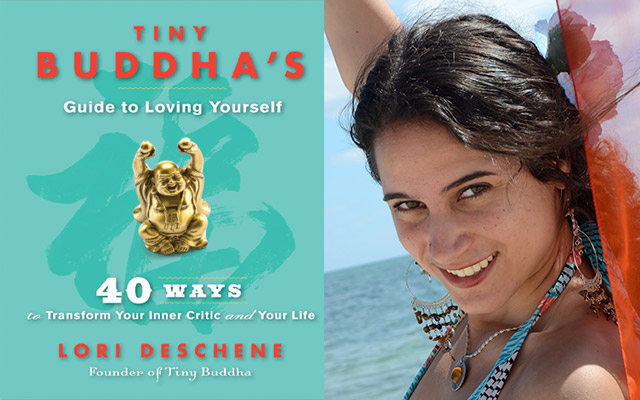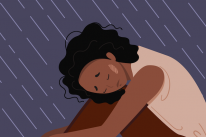
This is second week of a month-long promotion for Tiny Buddha’s Guide to Loving Yourself, a book about taming your inner critic that features 40 stories from Tiny Buddha contributors.
Over the next month, you’ll have a chance to meet some of them contributors through daily interviews here on the blog.
Today’s featured contributor is Jeanine Nicole Cerundolo, a yoga instructor and bliss coach who’s on a mission to nurture a world in which we are each more self-affirming through an abundance of self-love, more confident in the power of our dreams, and more fulfilled in the process of reaching them.
Her contribution for the book explores the benefits of embracing both positive and negative emotions instead of assuming we need to always be happy.
A little more about Jeanine…
1. Tell us a little about yourself and your self-love journey.
As a sensitive soul and highly emotional being, I have been very attuned to both the delights and the darkness of life, simply in feeling each deeply.
My self-love journey has been a path to first, knowing myself; second, accepting myself; and third, letting myself be and allowing the richness of life to flow, without trying to control it with pre-conceived notions, concepts, or desires.
As I continue to delve into transformational work and immerse myself in such communities, I’m gaining traction in terms of my growing self-confidence, self-assurance, and self-actualization. I’m becoming all that I dreamed of by simply owning that I have always been what I’ve been seeking.
It is the recognition of my gifts and gratitude for them that make up the embodiment of self-love. Through this, I know that my life is a gift not through what I do, but in who and how I am in the world.
2. Have you ever felt there’s “something wrong with you”? If so, why, and what’s helped you change your perception?
I don’t often feel there is “something wrong with me,” but I definitely am very hard on myself and tend to put a tremendous amount of pressure on myself to achieve, succeed, and blossom.
I am often impatient with my “flaws” or my “shadow side,” and the resistance to these parts of myself only magnifies their power.
Tools that help me shift from self-doubt and self-loathing to self-love include breath work (just breathe!), writing a gratitude journal, reminding myself that this too will pass and is simply part of the process, and reaching out for help when necessary.
As the saying goes: “Joy shared is doubled, and grief shared is halved.”
I also collect nice things people share about what they value in me and read it when I’m feeling blue, for a little pick-me-up.
3. Have you ever thought something was a flaw only to realize that other people actually appreciate that about you? What was the “flaw”?
I am often very self-expressed and can feel that this is a flaw when I share in an over-the-top way, talk too fast in my excitement, or come on too strong.
I think that this exuberance does have its drawbacks when expressed in excess, but that my enthusiasm for life and the topics that get me jazzed can actually become contagious, and are even admirable.
I think the key here is to reign myself in a bit by exercising a balanced approach, thinking before speaking, and sharing for the sake of contributing to others, not just because I feel like it.
4. What was your biggest mistake (that you’re willing to share), and what helped you forgive yourself?
My biggest mistakes are always when I think that the “truth” or my “happiness” resides outside myself.
When I admire another to the point of being jealous or insecure, or when I want something (an opportunity or a relationship) so badly that I miss out on the joy and wholeness of the present moment, that is when I am robbing myself of the truth that I am already complete.
There is a spiritual teaching that says, “Everything hurt shall be healed again, everything lost shall be found again.”
The process of trusting myself and reminding myself to go within for the answers and the peace that I seek allows me to feel relief from the grasping or desperation that feeds the myth that I am “not enough.” Lately, prayer and meditation have really helped center me in that knowing.
5. Complete this sentence: When other people don’t like me, I…
…curl up in a ball and get sad.
6. What are some areas in your life where you’ve compared yourself to other people, and what’s helped you let go of these comparisons?
I compare myself to others in the area of doing-what-you-love. Because writing, yoga, coaching, and entrepreneurship are so important to me, those are the areas where I am hard on myself or become jealous of others.
If someone is a nuclear physicist, I think, “Hey, more power to you.” It doesn’t trigger me because it is not in me by any means to by a nuclear physicist.
But if someone is a “better” yoga teacher, published author, or seemingly experiencing more success than I am in the zones that I am working on, then that actually highlights the places where my potential is unrealized and itching to be fulfilled.
I can become uncomfortable in those moments, but in the end, returning to the knowing that I am on the path, and then feeling grateful for these opportunities to see where I can still grow—and becoming inspired by those people who are already in the game—are ways I can shed the destructive comparisons and replace them with affirmations.
7. What’s one thing you would tell your younger self about looking to other people to complete you?
I would tell my younger self that it is important to neither be dependent nor independent, but to be interdependent.
It is vital to be and feel whole and complete for who you are and to love yourself, and it is also vital to feed that soulfulness through nourishing interactions with others and in a loving community.
Not looking to others to complete you doesn’t mean to become an island, it just means not feeling like you are missing something or that your worth is contingent on what others think about you.
8. Have you ever felt afraid to show people your “real” self? Why—and what’s helped you move beyond that?
I have to admit that I am rarely afraid to show my true colors. I wear my heart on my sleeve, and my work is actually to contain myself a bit more and practice restraint since I’m so eager to be open and vulnerable; but then sometimes feel like I spilled the beans too much and then worry about how my sharing will come across.
Usually, it’s not as bad as I imagine, so it helps to remember that fear grows with the time and energy that you spend feeding it!
9. What are the top three things you personally need to do to take good of yourself, mentally and emotionally?
The top things I need to do to take good care of myself, both mentally and emotionally, are:
- Daily morning practice of meditation, yoga, journaling, and reading inspirational texts
- Breathwork and healthy habits regarding nutrition and exercise
- Practicing gratitude, especially blessing food before eating
- Being gentle with myself, treating myself as I would a good friend
10. What’s something you do regularly that makes you feel proud of the difference you’re making in the world?
When I engage in the pursuits I love most—working in yoga, life coaching, and writing—I become the highest version of myself and feel most generous, gracious, and giving.
Agapi Stassinopoulos says, “Be a go-giver, not a go-getter” and I think these words are beyond wise! When you do what you love and you aim to serve, and for your work to be a contribution to others and to the world, that alignment is true bliss!
*Note: I edited this post to remove info about the pre-order promotion, which ended on October 8, 2013. You can learn more about Tiny Buddha’s Guide to Loving Yourself here.
About Lori Deschene
Lori Deschene is the founder of Tiny Buddha. She started the site after struggling with depression, bulimia, c-PTSD, and toxic shame so she could recycle her former pain into something useful and inspire others to do the same. You can find her books, including Tiny Buddha’s Gratitude Journal and Tiny Buddha’s Worry Journal, here and learn more about her eCourse, Recreate Your Life Story, if you’re ready to transform your life and become the person you want to be.
- Web |
- More Posts













 Though I run this site, it is not mine. It's ours. It's not about me. It's about us. Your stories and your wisdom are just as meaningful as mine.
Though I run this site, it is not mine. It's ours. It's not about me. It's about us. Your stories and your wisdom are just as meaningful as mine.
I love the honesty in your answers ! Thank you